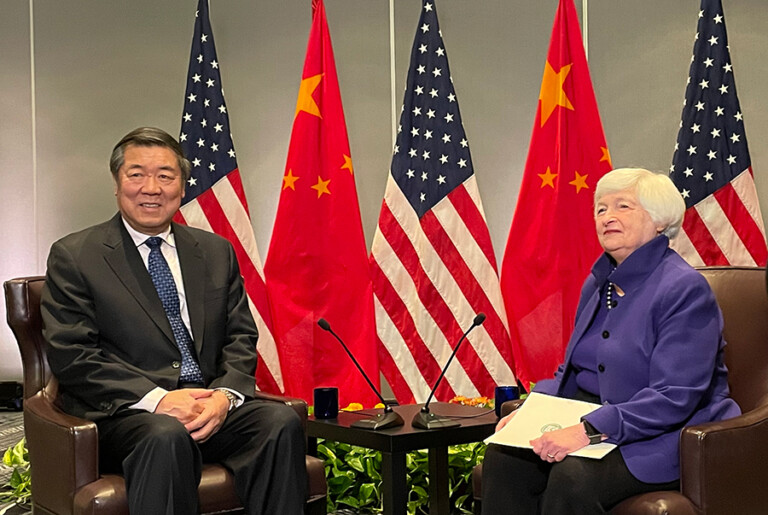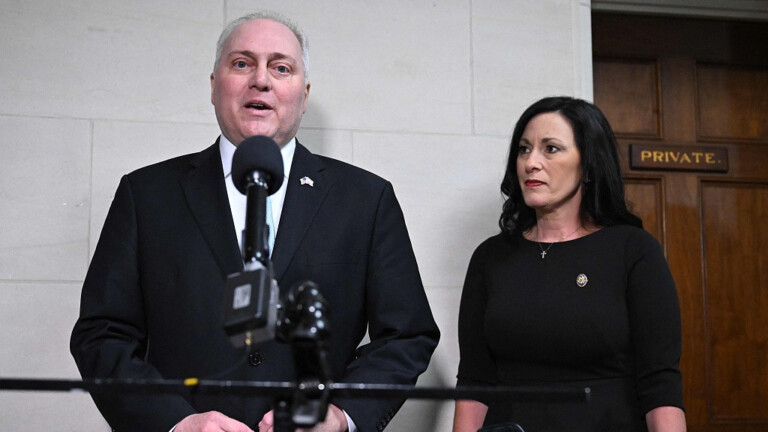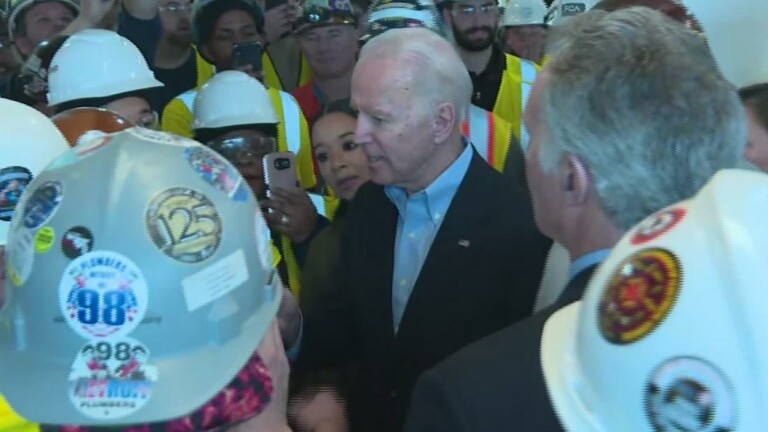U.S. Sen. Joe Manchin believes the Inflation Reduction Act puts West Virginia in the ideal situation to offer both fossil fuel energy and clean energy solutions, and he is simply too busy making sure the IRA is properly implemented to worry about his political future.
“I think it’s a tremendous opportunity for West Virginia,” Manchin said. “We are fertile ground to finding out what energy policies will work and not jeopardize our energy independence.”
Manchin joined West Virginia University President E. Gordon Gee and Marshall University President Brad D. Smith for a lunchtime panel at the fifth annual Focus Forward symposium at the Morgantown Marriott at Waterfront Place. The event is organized by the West Virginia Public Education Collaborative at WVU.
Topics of this year’s Focus Forward symposium include creating an “enabling environment for green energy,” “reimagining energy and fueling innovation in West Virginia,” “preparing tomorrow’s workforce for today’s classrooms,” and accessing federal funding. Speakers included WVU professors, business leaders, educators, and lawmakers.
Speaking prior to Wednesday’s symposium, Manchin said West Virginia is key to providing the nation and the world reliable energy. With Saudi Arabia announcing a slowdown in oil production and Russia controlling natural gas supplies to Western Europe, West Virginia can play a role.
“Reliable energy is what this country has to have. We have to be energy independent if we’re going to be secure,” Manchin said. “We see what happens when someone weaponizes energy. Russia did it to Europe, and Europe was in one hell of a mess. They were able to escape that because the winter was not as brutal as it could have been, and we were able to start getting (liquid natural gas) to them quicker than anyone anticipated.”
Manchin said no to President Joe Biden’s $1.75 trillion Build Back Better social spending bill at the end of December, concerned about the bill’s price tag and potential to grow inflation and the deficit. But after months of negotiations with Democratic congressional leaders last summer, Manchin came on board for the $737 billion Inflation Reduction Act.
The IRA included $437 billion in spending on new investments in clean energy, climate change mitigation, an extension of Affordable Care Act subsidies, and funding for western drought resiliency. It also included $300 billion for reduction of the national deficit. Despite its name, most of the attention the IRA receives is for its energy provisions.
“I wrote that bill based on energy security. That’s all,” Manchin said. “We wrote the bill basically for the next 10 years that we will be producing the energy we need from our fossils cleaner and better than any place in the world; that helps the climate by replacing the dirty fossil.”
Manchin pointed to multiple projects happening in West Virginia that are benefiting from the tax breaks and access to federal funding in the IRA. Tax incentives in the bill are paving the way for a clean hydrogen hub. The Appalachian Regional Clean Hydrogen Hub, or ARCH2, would take advantage of the state’s access to natural gas supplies and existing infrastructure to manufacture blue hydrogen and store the carbon emissions underground.
“We also believe very strongly that we can manufacture the technologies for the future that’ll help us have the energy supply that we need and do it with less carbon emissions,” Manchin said. “There’s more demand for fossil fuel today than there has ever been in the history of the country, in the world. The demand for energy is going to grow.”
North Carolina-based steel manufacturer Nucor is building a new electric arc furnace in Mason County and seeking access to cleaner energy. Two Berkshire Hathaway companies, BHE Renewables and Precision Castparts Corp., are building a modern titanium melt facility in Jackson County powered by its own solar energy microgrid, the first in the nation. Massachusetts start-up Form Energy will build a proprietary iron-air battery for use in wind/solar energy storage on the site of the former Weirton Steel.
“I think in America right now, we have more investment because of the Inflation Reduction Act coming from around the world,” Manchin said. “If you don’t think the bill’s successful in attracting the investments in the United States, then go ask the Europeans why they’re so mad about the bill and how they’re trying to compete.”
Manchin, though, hasn’t been completely happy with how the IRA is being implemented. Manchin accused the Treasury Department of skirting the clear provisions of the IRA that require electric vehicle manufacturers to source their battery materials from domestic sources when possible or from friendly nations. Treasury Department rules appear to allow more countries to participate than what Manchin believes should have been allowed.
“They’re liberalizing their interpretation basically, rather than us accelerating our development of the new technologies to make batteries here in America and how we not only process, but how we manufacture the parts of making that battery here in America,” Manchin said. “The intent of that legislation was to bring manufacturing as rapidly as possible back to the United States so we would not be dependent upon China or any other rogue nation that doesn’t wish us well, that doesn’t have our values.”
Manchin pointed to the news Tuesday of $8 million in funding from the U.S. Department of Energy for WVU through the Infrastructure Investment and Jobs Act for a new facility to extract and separate rare earth elements and critical minerals and materials from mining waste. He believes projects like that will help secure a domestic supply of the ingredients needed for electric vehicle batteries.
Manchin has been politically attacked for supporting the IRA. While inflation has decreased from a high of 9.06% last June, it remains just above 6% as of the end of February. While Manchin said the IRA is meant to keep fossil fuels part of the mix, much of the focus of the Biden administration has been on wind and solar. And with the U.S. Treasury’s proposed rules, it could keep the national reliance on foreign sources of rare earth minerals for batteries.
Manchin said he negotiated in good faith on the IRA and if the Biden administration is acting in bad faith, Manchin will explore legal options to ensure the IRA is implemented the way he believes it is intended to be.
“If there is a betrayal, it’s a betrayal of the American people, not to me,” Manchin said. “If they want to basically try to liberalize the intent of the bill, they know how the bill’s written. They can see the wording. We’re going to be very active in the comment period. And if I can do anything else as far as through the judicial system, I’ll do it.”
Manchin also was upset Wednesday with the decision Tuesday from the U.S. 4th Circuit Court of Appeals that vacated a water permit issued by the West Virginia Department of Environmental Protection that would allow the Mountain Valley Pipeline to continue construction. The 303-mile pipeline will transport natural gas from the northern part of the state to Chatham, Va. The project has been plagued by delays.
“They’ve sent it back three times. It’s gone through the process three times now,” Manchin said. Every time it comes to the court, the court sends it back to the agencies, and the agencies go through the process again. They keep thinking they’ll wear them out, and they’ll spend enough money, and they’ll just go away like the Atlantic Coast Pipeline.”
With Manchin concerned over the implementation of the IRA, working on permitting reform for oil and natural gas projects and the upcoming debt ceiling fight in Congress, the last thing Manchin is concerned about is announcing his political intentions.
Having served for more than 13 years in the U.S. Senate, Manchin is up for his third six-year term in 2024 but has yet to announce a re-election effort.
Speculation is Manchin is considering a third-party presidential run through No Labels, but Manchin said announcing his political plans before the end of 2023 would just put a target on his back and make him a distraction.
“I’ll just wait till the end of the year. There’s just too much work to be done,” Manchin said. “For me to put my name in now, which I very seldom have ever done in advance, acknowledging what I intend to do. It just basically puts a target on you to where you’re not as effective in the halls of Washington. People say, ‘yeah, you’re a target.’ I say I may or may not be. I have no clue. Let’s see what gets done this year. I’ll make a decision.”
Source : The Intelligence







